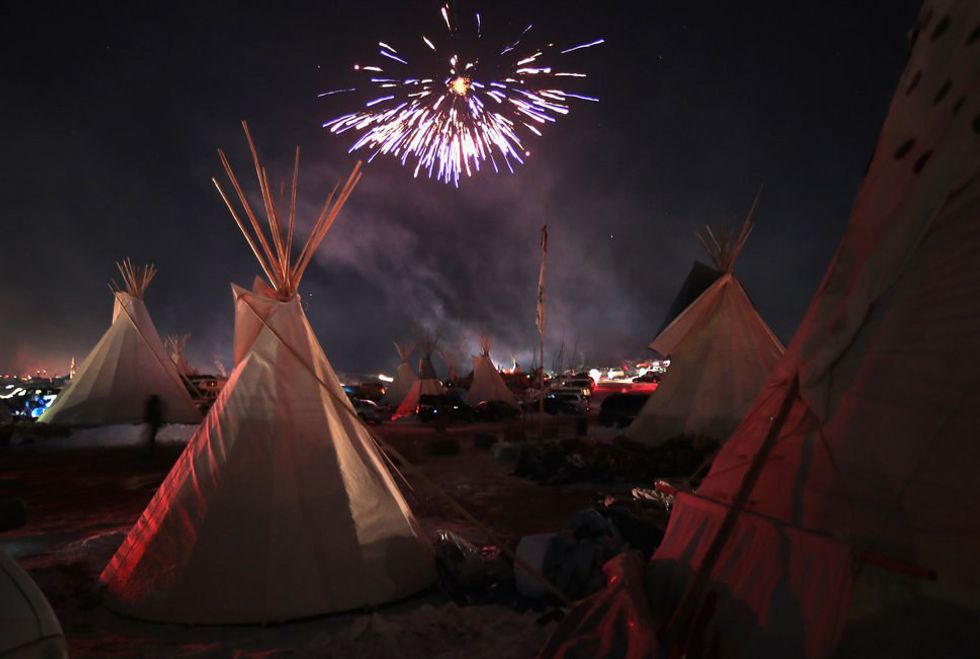On December 4th, the U.S. Army Corps of Engineers declared that it would not approve the final easement necessary to complete the $3.8 billion Dakota Access Pipeline project.
'Easement' of course refers to the greatly controversial proposition for the pipeline to cross under North Dakota's Lake Oahe- the prime and protected source of water for the Sioux Tribe that has been residing there for decades. The pipeline, which would be constructed hardly a mile upstream from the reservation, could have a massive impact on the more than 8,000 tribal members downstream who depend on its supply, and more importantly, the cleanliness of that supply. Besides the threat of environmental hazard , the proposition would also disturb sacred burial sites.
For now, the Army has announced that it plans to explore alternate routes. While the proposed pipeline still remains a giant concern as far as economic and environmental factors are involved, Assistant Secretary of the Army Jo-Ellen Darcy maintains that, "it's clear there's more work to do", and that a need for greater research and public involvement regarding the ultimate decision is vital.
photo by Scott Olson
Fireworks lit up over the still snow-crusted campgrounds in celebration of the decision. It was a day for jubilation, but its continuation isn't guaranteed. In an article published November 3, 2016 the New York Times Editorial Board states: "The Sioux know as well as any of America’s native peoples that justice is a shifting concept, that treaties, laws and promises can wilt under the implacable pressure for mineral extraction." Oil is arguably a politician in its own right. Still lacking in substantial and accessible modes of alternate energy and devices, it then becomes a politician with a lot of demand, and a lot of deciding power.
This deciding power will continue to hold a forefront platform as 2016 comes to a close, giving way to the 2017 inauguration. President-elect Donald Trump, who only just recently sold his stakes in Energy Transfer Partners (the company responsible for the project), plans to review the case upon entering office. His administration has said that it approves the project. Energy Transfer Partners stated recently that it has no plans for rerouting.
Oil is at this time, favorably or unfavorably, a critical thread to the fabric of both our economy and the world's economy. If a pipeline isn't ravaging our own land, it will still ravage abroad. It seems unlikely that the new pipeline won't be built, but there are still steps to be taken to ensure that the pipeline stays away from the Sioux reservation. You stood with Standing Rock. But it isn't time to sit down just yet. You may not be able to operate a standard car without oil, but you sure you can't drink it either.
How Can You Get Involved?
1) Sign the petition
Help to reject the Dakota Access Pipeline by adding your name to the list of over 400,000 signatures.
2) Call the White House
It's not that nerve-wrecking, promise! The public comment line is manned by a huge team of volunteers, and the switchboard by staffed White House operators who can help get your concerns to the right place. Call here or refer to the numbers down below. Aren't sure how to word your request? Check out a simple and straightforward breakdown of the process and etiquette here. Remember- you don't have to be a professional, but you should always compose yourself professionally when calling.
For comments to the White House: 202-456-1111
For the Switchboard number: 202-456-1414
3) Call the governor of North Dakota
Leave a message for governor Jack Dalrymple at 701-328-2200 urging a #NoDAPL agenda. Refer to #2 on remaining professional.
4) Contact executives in charge of the pipeline
Lee Hanse, Executive Vice President Energy Transfer Partners
Telephone: (210) 403-6455
Lee.Hanse@energytransfer.com
Glenn Emery, Vice President Energy Transfer Partners
Telephone: (210) 403-6762
Glenn.Emery@energytransfer.com
Michael (Cliff) Waters, Lead Analyst Energy Transfer Partners
Telephone: (713) 989-2404
Michael.Waters@energytransfer.com
4) Educate yourself
Educate yourself about the effects of pipelines and circumstances regarding both above-ground and underground pipelines in the past, along with energy alternatives so that you're knowledgeable when talking to others. Research treaties, past offenses regarding Native American property, and the current standing regarding the Sioux's lawsuit against the U.S. Army Corps of Engineers. Brush up on your grasp of the Clean Water Act, the National Historic Protection Act, and the National Environmental Policy Act. Tweeting #NoDAPL is great for bringing a movement closer to the surface, but the understanding of it has got to go far below the surface. Awareness is the first step of anything.
Only when the last tree has died, and the last river been poisoned, and the last fish been caught, will we realize we cannot eat money - Cree Proverb






















